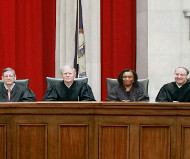Article from: www.thenewspaper.com/news/64/6453.asp
4/27/2018
Virginia Supreme Court One Step From Banning License Plate Spying
High court in Virginia sides with attorney general opinion questioning the legality of widespread license plate surveillance.
 Police use of automated license plate readers (ALPR or ANPR) to track motorists may soon come to an end in Virginia. The state Supreme Court on Thursday took a big step toward finding that the devices may violate state laws governing data privacy.
Police use of automated license plate readers (ALPR or ANPR) to track motorists may soon come to an end in Virginia. The state Supreme Court on Thursday took a big step toward finding that the devices may violate state laws governing data privacy.
Motorist Harrison Neal filed a complaint against the Fairfax County police after he obtained evidence that the department's plate readers had tracked and photographed his car, even though he was never suspected of any criminal activity. Neal's car had been swept up in "passive" ALPR surveillance, and civil rights groups including the American Civil Liberties Union (ACLU), Electronic Freedom Foundation (EFF) and Rutherford Institute took up his case, which took advantage of a 2013 state attorney general ruling finding such surveillance illegal (view ruling).
A lower court tossed Neal's case in 2016, saying the data collected by police was not "personal information" subject to privacy protections (read decision). Neal appealed, arguing the information stored in the police surveillance database could be readily converted into personal information.
In reviewing the situation, the high court noted that the stated purpose of Virginia's Data Act was to preserve the rights of free citizens by limiting the collection and dissemination of personal information. The high court was not swayed by lower court's reasoning and instead found that the camera systems images along with time, date and GPS location data can convey a great deal of information about a person.
"The conclusion that the picture and associated data is 'personal information' is consistent with the legislature's intent to remedy the potential mischief posed by the extensive collection, maintenance, use and dissemination of personal information and the potential for misuse of such information," Justice Cleo E. Powell wrote for the court.
The justices were less certain about the next prong in the legal test. To be covered by Virginia's Data Act, the ALPR device must be classified as an "information system" that contains personal information about individuals.
"Although the ALPR database does not contain any information related to the individual to whom a specific license plate number is registered, that does not mean that the total components of the police department's ALPR record-keeping process do not provide a means for discerning that information," Justice Powell wrote. "The case will be remanded for a determination of whether the total components and operations of the ALPR record-keeping process provide a means through which a link between a license plate number and the vehicle's owner may be readily made."
That leaves the ultimate fate of cameras in the hands of the trial court. A copy of the ruling is available in a 60k PDF file at the source link below.
Source: Neal v. Fairfax County Police Department (Virginia Supreme Court, 4/26/2018)
Permanent Link for this item
Return to Front Page
 Police use of automated license plate readers (ALPR or ANPR) to track motorists may soon come to an end in Virginia. The state Supreme Court on Thursday took a big step toward finding that the devices may violate state laws governing data privacy.
Police use of automated license plate readers (ALPR or ANPR) to track motorists may soon come to an end in Virginia. The state Supreme Court on Thursday took a big step toward finding that the devices may violate state laws governing data privacy.